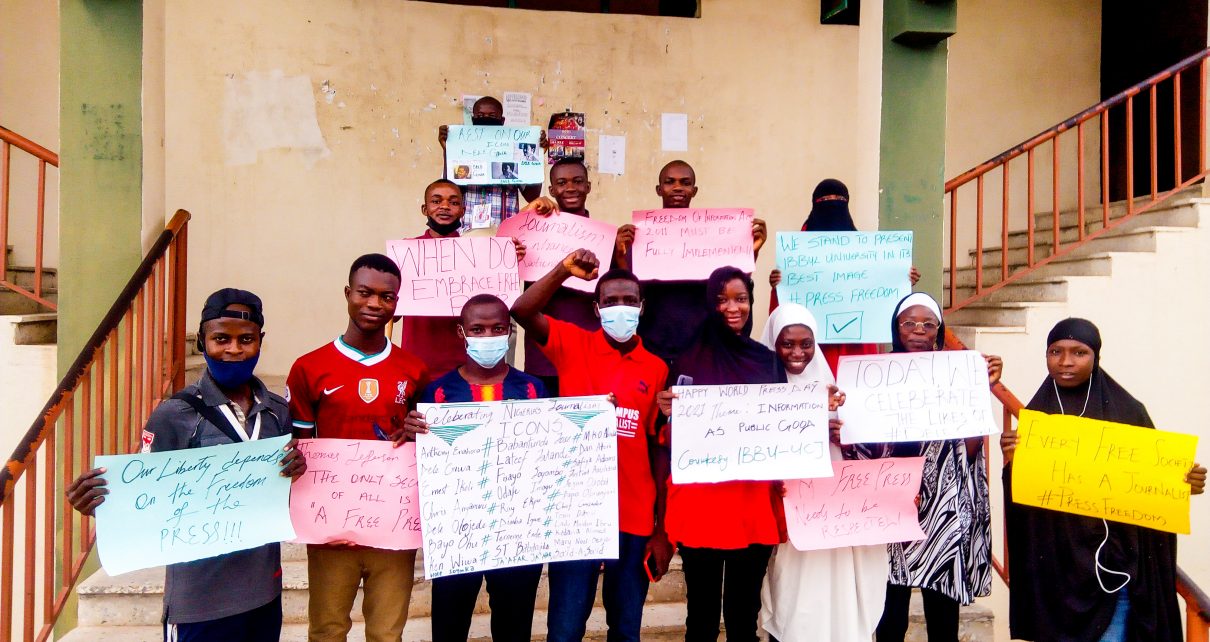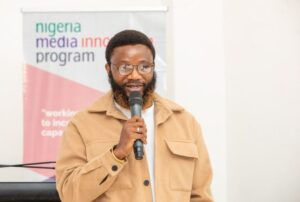What is the level of press freedom in tertiary institutions in Nigeria? Abdulwaheed Sofiullahi and Abdulrasheed Hammad report on threats and other restrictions campus journalists are enduring.
For over a decade, the Health Centre of the Adekunle Ajasin University, Akangba Akoko, Ondo State had existed in an unhealthy state on swampy land.
Instead of getting used to the decadent state of the centre like others, Roland Bayode, a campus reporter opted to report about the poor medicare offered to students and other members of the university community.
From January 2, 2020, after the publication of the in-depth investigative story titled AAUA: Decadence of a 21st Century University’s Health Centre in over nine mainstream media including Premium Times, The Nation, and The Guardian, Bayode started getting frightening calls from the management accusing him of tarnishing the image of the institution.
He constantly had sleepless nights. He was troubled about what would be the decision of the school management after facing the disciplinary committee. He was not sure if he would be rusticated for the ‘embarrassing story”
“The first person I met at the school Senate building when I went to face the school disciplinary committee was the University Public Relation Officer (PRO). He shouted at me, abused and compared me with ferocious things. It was so tough then,” Roland recounted his ordeal.
If he thought it was only the school management that was not pleased with him over the report he wrote to put an end to the problem of poor medicare faced by the students of the institution, he was shocked that almost all his course mates also criticized him. He was mentally affected as people accused him of exposing the school management about the downright and poor health care on campus.
“It really affected me a lot and I performed woefully that semester because of the tough experience that I encountered. It’s very tough because I was mentally down. I even received criticism from my classmates, saying it’s over-performing. I thank God that it went well. Although I lost some things, it prepared me for what I would be encountering when I start fully as a mainstream journalist,” he stated.
Bayode’s ordeal is a typical instance of what campus journalists seeking to hold managements of higher institutions in the country accountable, just like professional journalists who also face various hazards.
Nigeria is ranked 120th of 180 countries in the World Press Freedom Index compiled by RSF (Reporters Without Borders) in 2020.
HOW CAMPUS JOURNALISTS ARE INTIMIDATED BY SCHOOL AUTHORITIES
Samuel Ajala, the President of the National Union of Campus Journalists, Nigeria (NUCJ), and a final year student of History and International Studies, Federal University Oye-Ekiti, Ekiti state, recounted how some campus journalists are being restrained in his local chapter.
“Personally, I’m not facing any intimidation from the school management, but I’ve seen cases where some of our members have published stories that exposed the school management’s imbalances and they aren’t happy about it.

“Such cases are actually managed mutually. It happened when the school management held one of our members guilty of publishing a story about their lapses and it went viral. Even though they were planning to rusticate the writer, but we later met them and the case was settled manually,” he said.
“All our local media outfits are actually free because we ensure they’re standing alone and registered independently by their respective school managements. They can’t be controlled by their students’ Union or school management, this is what we do to ensure press freedom. Even we at the national body that says we should be controlling what they’re publishing on their social media pages because the rules are in line with the NUJ standard.
“There may not be an existing case that’s lingering about press freedom on campuses, we noticed that school managements want to be controlling local press outfits. For instance, in Adamawa State University, the school management banned the press outfit and according to the information we gathered, the school management wanted to have power against the press outfit not to function independently.
“Also, in University of Ilorin, their Students’ Union Senate proposed a bill that all the press outfits in the school should be harmonised on campus and this is something we actually kicked against that all the press outfits should function independently without any external incursion so that we would be able to stick to the ethics of good Journalism.”
Raji Olatunji, a 400-Level student of Education Management from the University of Ibadan narrated his ordeal on how campus journalists are impeded to perform their duties.
“To some extent, there are limitations to the freedom of media organisations on University of Ibadan campus. This is not far-fetched from the known fact that the management of the school doesn’t like to see their inactions published by her students,” he stated.
“There have been cases of campus journalists being sanctioned for articles published against the school management. Thus, for campus journalists in UI, the fear of Students’ Disciplinary Committee is the beginning of safe practice.”
Friday Omosola, a 200-Level student of Mass Communication at Adekunle Ajasin University stated that campus journalists do not enjoy the freedom to practice on campus because of censoring by the management
Fasilat Olawuyi, a graduate of Mass Communication at Mashood Abiola Polytechnic recalled that she was cautioned severally not to write against the school management.
“So, I’ll say basically in my school we don’t have any sort of written law hindering Press Freedom. Campus journalists are free to publish what they consider publishable but always reminded to pick up developmental journalism.
“There are however instances where some stories are not written because you’ll have to value your studentship and reprisal attack that might come from the school management. I have not faced such big intimidation, but I have been cautioned and warned to tread carefully at a particular time.”
Adedimeji Quayyim Abdul-Hafeez, a 300-Level student of Common and Islamic Law, University of Ilorin disclosed how they are being careful not to report anything against the school management.
“I try as much as possible to be ethical in my dealings and ensure that I report the truth. I have written on realities about the management’s activities and I have had no problems on my reports. My press organization has been so helpful in this regard, to ensure that we do not undergo the chaos of victimization from authorities, so I have been doing great and fine.
“To be honest, we are not too free realistically. We just try our best to report happenings without getting into trouble. We pitch out reports to mainstream newsrooms to publish our works when we sense that they might cause problems. The student regulations handbook for my institution just provides for mandatory registration of campus bodies, campus press organizations inclusive, and that they mustn’t publish reports that could promote falsehood or promote violence.”
An editor in Usmanu Danfodiyo University (UDUS), Sokoto who prefers to be anonymous explained what happened between the UDUS press outfits and the school management when they were accused of what they knew nothing about and how campus journalists are restricted by the school management.
“I didn’t face this because I wasn’t the one that wrote the story. When I was the Editor of one of the five press outfits on campus, a student (still unknown) wrote an article entitled: Save UDUS. As contained in this write-up that went viral, the writer was actually protesting the level of insecurity on campus then. The management was not pleased with this, and in their effort to track the original writer, all editors on campus were accused and made to face a disciplinary committee.
“Being the editor of a leading press outfit on campus then, I was directly accused at the panel. However, after all this interrogation and intimidation, the identity of the original writer is still unknown till today, but I could beat my chest, likewise other editors at that panel that the writer was not a campus journalist seeing how badly the article was written.
“Since then, the UDUS has become harsh on campus journalism and seemingly trying to clamp down on enterprise journalism as students’ handbook gives such regulatory power on students’ association.”
Students of Ibrahim Badamasi Babangida University, Lapai, Niger State also narrated their ordeals on how the University management is intimidating them not to publish negative reports about the school.
Mohammed Yakubu, a final year student of Mass Communication revealed that the intimidations are countless and always arose when the management is not satisfied with any story depicting some deficiencies in the school.
“Now, it’s not a personal matter, it involves all UCJ members of IBB University. Well, we believe truth is unassailable and nothing can change our stand, ” he stated.
“While we may sympathise with them over the scars on the school image that must be positively kept upfront at all time as they have said, we advocate for proper flow of information between the management and the pressmen.
“If the management has been making efforts to fix the water scarcity or power outage, let the press know about the efforts to calm the students’ aggressions.
“We are free to some extent because journalists operate in a hostile environment where their freedom and safety suffer.”
He, however, stated that there is a law that is restricting the freedom of campus journalists but they are unknown to the students because only a few students have the students’ handbook.
He said the Dean Students’ Affairs maintains that there is a law that restricts students from posting a negative report on social media about the school management.
Hamzat Ibrahim Abaga, a 400-Level student of Mass Communication also disclosed that he has faced intimidation from the school management severally and he has been threatened on different occasions that he would be dismissed from the school.
“We are not completely free, because we face threat, intimidation, and harassment whenever we published a story against the school management.
“I have not seen a law that is hindering the press freedom on campus, but the management kept on telling us to do our journalism based on the provision of the university handbook,” he stated.
HOW TO ENTRENCH PRESS FREEDOM ON CAMPUSES
In his response to a question on the state of press freedom on campuses at a tweet Chat by NUCJ, CEO/Publisher of Premium Times, Dapo Olorunyomi noted that “campuses are microsets of the larger Nigerian community and by all parameters, press freedom is deteriorating in Nigeria as a whole.”
To fully entrench press freedom on our campuses, Olorunyomi said there is the need to understand the ramification of the concept itself.
” There are four key components: [a] the legislative context created by campus regulations, [b] the independence offered through training, ethics, [c] the pluralism offered by the diversity of content and actors like the gender inclusivity of campus journos and [d] the safety of campus journos. To entrench the regime of press freedom on campuses we need to build these four pillars concretely.
“Our campuses incubate leaders of our country. So, inculcating traditions of freedom as part of their emergence is a multiplier force for the kind of society we want to build in the future.”






